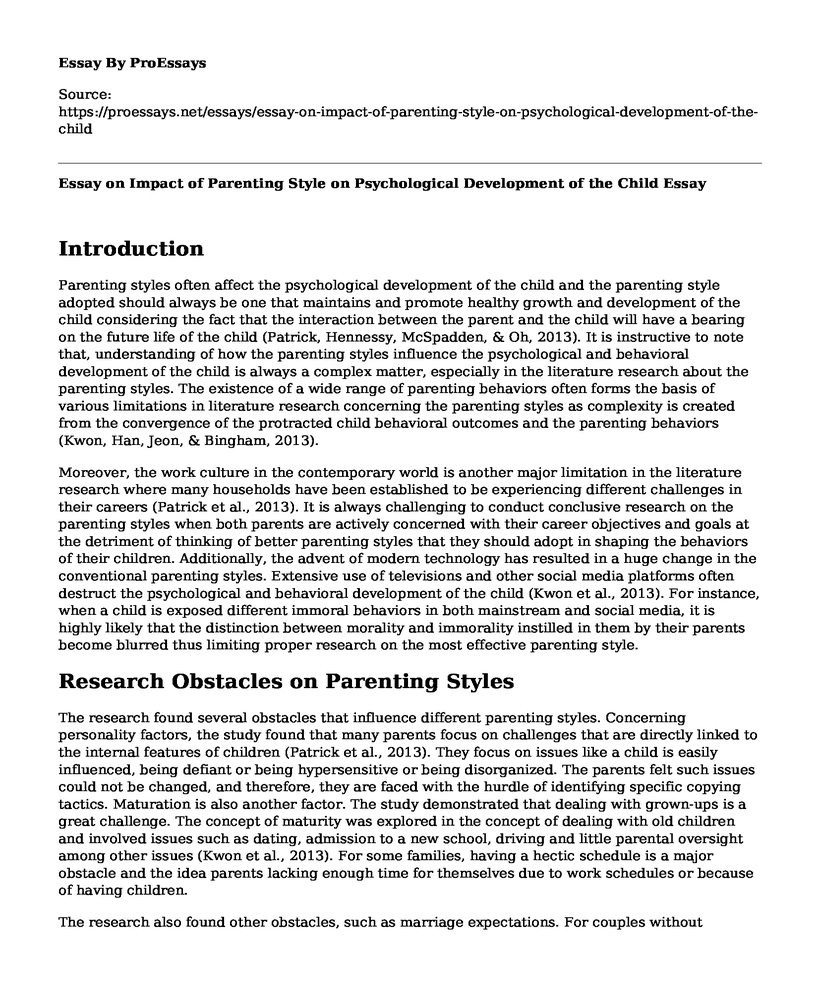Introduction
Parenting styles often affect the psychological development of the child and the parenting style adopted should always be one that maintains and promote healthy growth and development of the child considering the fact that the interaction between the parent and the child will have a bearing on the future life of the child (Patrick, Hennessy, McSpadden, & Oh, 2013). It is instructive to note that, understanding of how the parenting styles influence the psychological and behavioral development of the child is always a complex matter, especially in the literature research about the parenting styles. The existence of a wide range of parenting behaviors often forms the basis of various limitations in literature research concerning the parenting styles as complexity is created from the convergence of the protracted child behavioral outcomes and the parenting behaviors (Kwon, Han, Jeon, & Bingham, 2013).
Moreover, the work culture in the contemporary world is another major limitation in the literature research where many households have been established to be experiencing different challenges in their careers (Patrick et al., 2013). It is always challenging to conduct conclusive research on the parenting styles when both parents are actively concerned with their career objectives and goals at the detriment of thinking of better parenting styles that they should adopt in shaping the behaviors of their children. Additionally, the advent of modern technology has resulted in a huge change in the conventional parenting styles. Extensive use of televisions and other social media platforms often destruct the psychological and behavioral development of the child (Kwon et al., 2013). For instance, when a child is exposed different immoral behaviors in both mainstream and social media, it is highly likely that the distinction between morality and immorality instilled in them by their parents become blurred thus limiting proper research on the most effective parenting style.
Research Obstacles on Parenting Styles
The research found several obstacles that influence different parenting styles. Concerning personality factors, the study found that many parents focus on challenges that are directly linked to the internal features of children (Patrick et al., 2013). They focus on issues like a child is easily influenced, being defiant or being hypersensitive or being disorganized. The parents felt such issues could not be changed, and therefore, they are faced with the hurdle of identifying specific copying tactics. Maturation is also another factor. The study demonstrated that dealing with grown-ups is a great challenge. The concept of maturity was explored in the concept of dealing with old children and involved issues such as dating, admission to a new school, driving and little parental oversight among other issues (Kwon et al., 2013). For some families, having a hectic schedule is a major obstacle and the idea parents lacking enough time for themselves due to work schedules or because of having children.
The research also found other obstacles, such as marriage expectations. For couples without children, adapting to new responsibilities becomes a bigger problem. And the study found such challenges would affect a few households with children. Co-parenting is also another problem facing single mothers in society, and they find it difficult to overcome the negative influence of their ex-husbands on their children (Patrick et al., 2013). The study found that planning for the feature is also an obstacle facing childless parents who think that their decision in maybe three years would have long-term effects on their lives. Ultimately, the study found that most of the families did not think of health as a major challenge (Kwon et al., 2013).
References
Kwon, K. A., Han, S., Jeon, H. J., & Bingham, G. E. (2013). Mothers' and fathers' parenting challenges, strategies, and resources in toddlerhood. Early Child Development and Care, 183(3-4), 415-429.
Patrick, H., Hennessy, E., McSpadden, K., & Oh, A. (2013). Parenting styles and practices in children's obesogenic behaviors: scientific gaps and future research directions. Childhood obesity, 9(s1), S-73.
Cite this page
Essay on Impact of Parenting Style on Psychological Development of the Child. (2022, Mar 15). Retrieved from https://proessays.net/essays/essay-on-impact-of-parenting-style-on-psychological-development-of-the-child
If you are the original author of this essay and no longer wish to have it published on the ProEssays website, please click below to request its removal:
- Parental Incarceration Impact on Child Behavior Paper Example
- Essay Example on Carla Struggles in Building Relationships in School Hierarchy
- Ethical Issues With Medical Marijuana Essay
- Essay Example on Flowcharting for Visual Clarity: Benefits and Free Templates
- Essay Sample on Info Practices: Appreciating Needs & Seeking Solutions
- Adolescents: Becoming Violent in the Transition to Adulthood - Essay Sample
- Essay Example on Sexuality in Aging: Society's Taboo?







